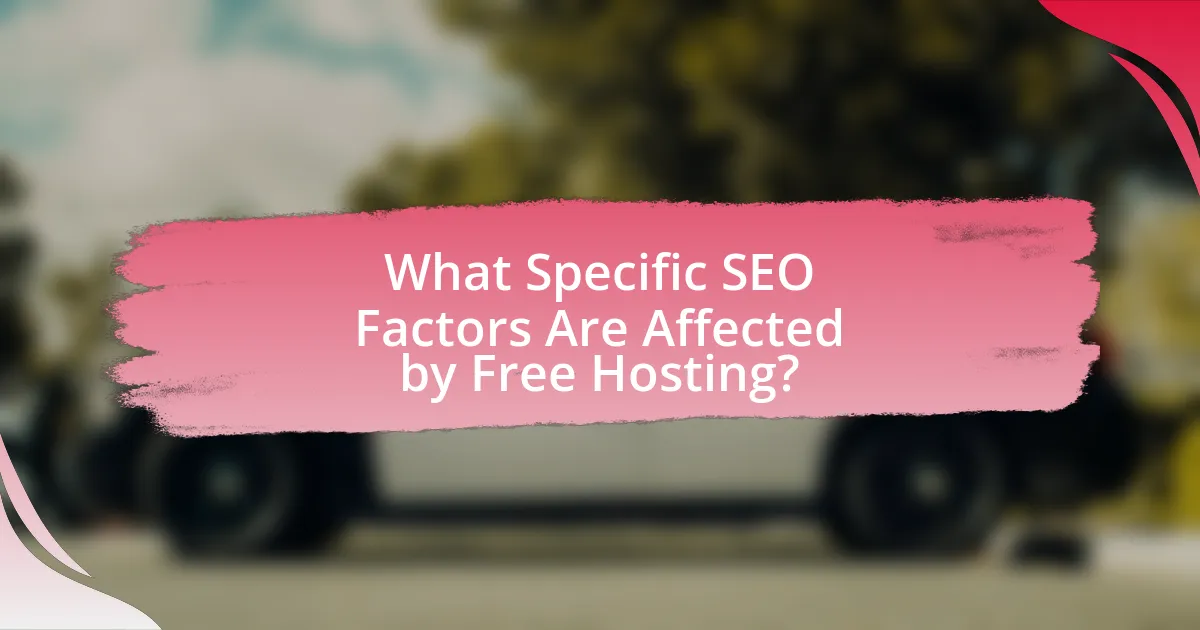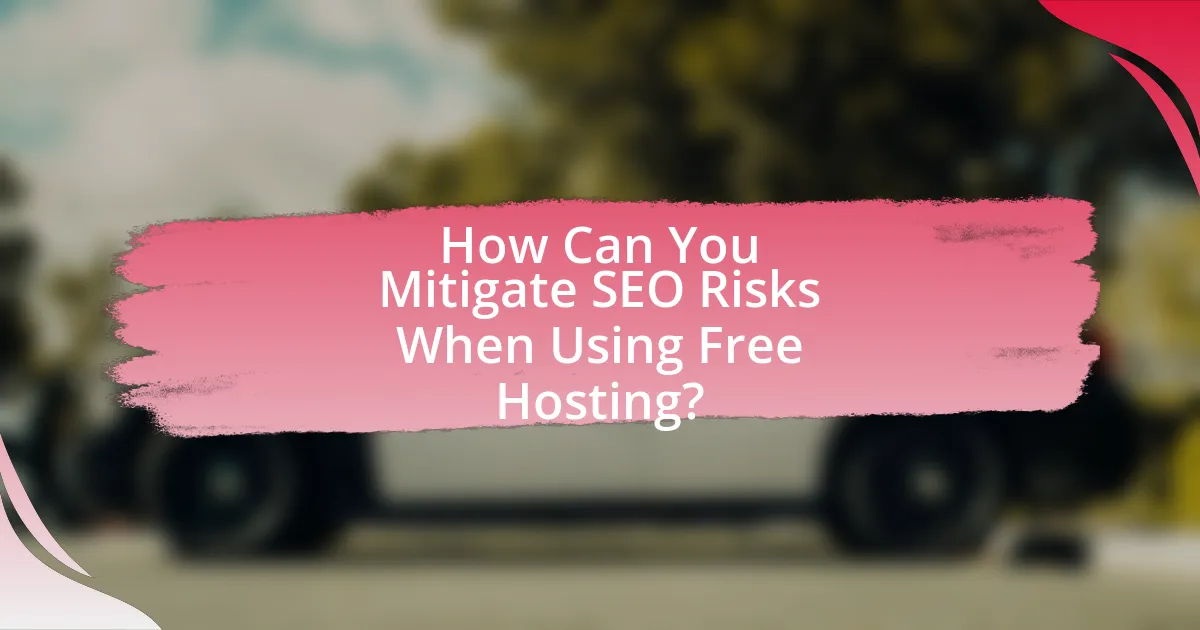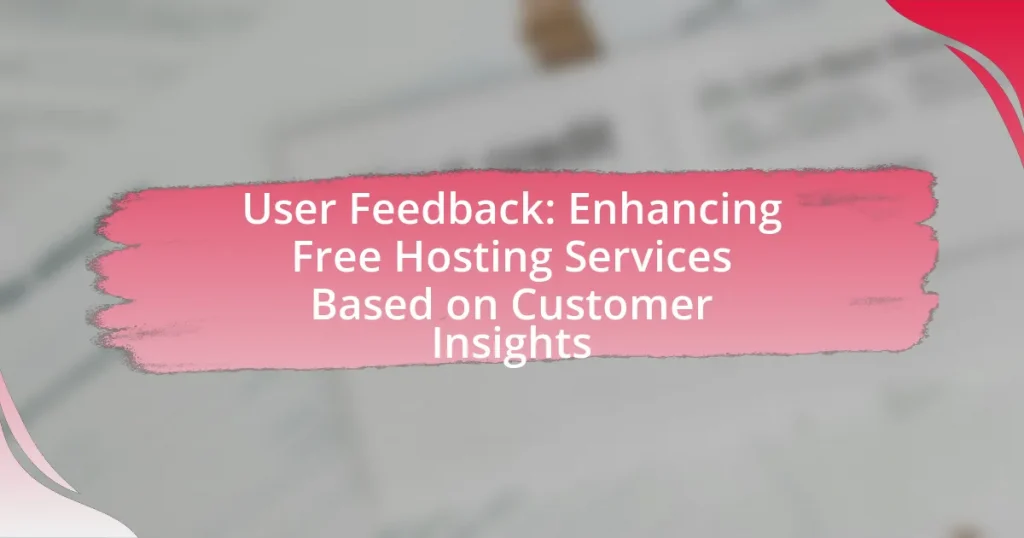Free hosting can significantly impact a website’s SEO performance due to various factors such as slower loading times, limited bandwidth, and the use of subdomains. These issues can lead to higher bounce rates, reduced visibility, and lower search engine rankings. Additionally, security vulnerabilities associated with free hosting can result in hacking risks that further harm SEO. While free hosting may offer cost-effective solutions for establishing an online presence, it often comes with drawbacks that can hinder a website’s overall search engine optimization efforts. The article explores these implications in detail, providing insights into how free hosting affects key SEO factors and offering strategies to mitigate potential risks.
How Can Free Hosting Affect Your Website’s SEO?
Free hosting can negatively affect your website’s SEO due to several factors. Websites on free hosting often experience slower loading times, which can lead to higher bounce rates; Google considers page speed as a ranking factor. Additionally, free hosting services may impose limitations on bandwidth and storage, resulting in potential downtime or unavailability, further harming search engine rankings. Furthermore, free hosting often includes ads or subdomains that can diminish user trust and authority, both of which are critical for SEO. Studies show that websites with reliable hosting and faster load times rank higher in search results, reinforcing the importance of choosing a quality hosting provider for optimal SEO performance.
What are the potential drawbacks of using free hosting for SEO?
Using free hosting can significantly hinder SEO performance due to several drawbacks. Firstly, free hosting often comes with limited bandwidth and storage, which can lead to slow loading times; research indicates that a one-second delay in page load time can reduce conversions by 7% (Source: Akamai). Secondly, free hosting services frequently display ads on user websites, which can detract from user experience and negatively impact search engine rankings. Additionally, free hosting providers may not offer a custom domain, making it harder for search engines to recognize and rank the site effectively. Lastly, security vulnerabilities are common in free hosting environments, increasing the risk of hacks that can lead to penalties from search engines. These factors collectively contribute to a diminished SEO performance for websites hosted on free platforms.
How does server speed impact SEO rankings with free hosting?
Server speed significantly impacts SEO rankings, especially when using free hosting. Search engines prioritize fast-loading websites, as they enhance user experience and reduce bounce rates. According to Google, page speed is a ranking factor; sites that load slowly may be penalized in search results. Additionally, free hosting often comes with slower server response times due to shared resources, which can lead to increased loading times. A study by Backlinko found that the average loading time of a top-ranking page is under three seconds, highlighting the importance of server speed in achieving higher SEO rankings.
What role does uptime play in SEO performance for free hosting?
Uptime is critical for SEO performance in free hosting, as search engines prioritize websites that are consistently accessible. High uptime ensures that users can access the site without interruption, which reduces bounce rates and improves user experience—factors that search engines like Google consider when ranking websites. For instance, a study by Google found that a one-second delay in page load time can lead to a 20% drop in traffic, highlighting the importance of reliable uptime. Therefore, free hosting services with poor uptime can negatively impact a website’s SEO by causing lower visibility and reduced traffic.
What advantages might free hosting offer for SEO?
Free hosting can offer advantages for SEO by providing a cost-effective way to establish an online presence, which can lead to increased visibility and traffic. When a website is hosted for free, it allows individuals and small businesses to create content and engage with audiences without financial barriers, potentially increasing the number of indexed pages and backlinks. Additionally, some free hosting platforms may offer built-in SEO tools or features that can help optimize website performance, such as mobile responsiveness and faster loading times, which are critical factors for search engine rankings.
Can free hosting improve accessibility for new websites?
Free hosting can improve accessibility for new websites by providing a cost-effective platform for individuals and small businesses to establish an online presence. This accessibility allows users with limited financial resources to create and maintain websites, which can lead to increased visibility and engagement. According to a report by the World Bank, over 3 billion people remain unconnected to the internet, and affordable hosting options can help bridge this digital divide by enabling more users to access online resources. By lowering the barrier to entry, free hosting services can facilitate the creation of diverse content and enhance the overall accessibility of the web.
How does free hosting influence website indexing by search engines?
Free hosting can negatively influence website indexing by search engines due to several factors. Websites on free hosting platforms often experience slower loading times, which can lead to poor user experience and lower search engine rankings. Additionally, free hosting services may have limited server resources and higher downtime, causing search engines to crawl and index these sites less frequently. Furthermore, many free hosting providers use shared IP addresses, which can result in spammy associations that harm a site’s credibility and indexing potential. These factors collectively hinder a website’s visibility in search engine results, making it less likely to attract organic traffic.

What Specific SEO Factors Are Affected by Free Hosting?
Free hosting negatively impacts several specific SEO factors, including site speed, uptime reliability, and domain authority. Websites on free hosting often experience slower loading times due to limited server resources, which can lead to higher bounce rates and lower search engine rankings. Additionally, free hosting services frequently have less reliable uptime, resulting in more frequent downtime that search engines penalize. Lastly, using a subdomain from a free hosting provider can dilute a website’s domain authority, making it harder to rank well in search results compared to sites with custom domains. These factors collectively hinder a website’s overall SEO performance.
How does the domain name impact SEO when using free hosting?
The domain name significantly impacts SEO when using free hosting by influencing brand credibility and keyword relevance. A custom domain name enhances trustworthiness, which can lead to higher click-through rates and better search engine rankings. In contrast, free hosting often provides subdomains that may appear less professional, potentially deterring users and affecting site authority. Research indicates that websites with custom domains rank higher in search results, as search engines prioritize domains that reflect a brand’s identity and relevance to user queries.
What are the implications of using subdomains for SEO?
Using subdomains can have mixed implications for SEO. Subdomains are treated as separate entities by search engines, which can dilute the authority of the main domain if not managed properly. For instance, if a website has a primary domain and multiple subdomains, the link equity may be spread thinly across these subdomains, potentially impacting overall rankings. Additionally, content on subdomains may not benefit from the main domain’s established authority, making it harder for subdomains to rank well in search results. According to a study by Moz, websites with a strong domain authority tend to perform better in search rankings, highlighting the importance of consolidating authority rather than fragmenting it across subdomains.
How does branding affect SEO with free hosting options?
Branding significantly affects SEO even when using free hosting options by enhancing visibility and credibility. A strong brand identity can lead to increased user trust, which often results in higher click-through rates and lower bounce rates, both of which are positive signals to search engines. Additionally, branded content is more likely to be shared and linked to, increasing organic backlinks that improve search rankings. Research indicates that websites with a recognizable brand tend to perform better in search engine results, as user engagement metrics are crucial for SEO algorithms.
What security issues arise from free hosting that can impact SEO?
Free hosting can lead to several security issues that negatively impact SEO, primarily due to the lack of robust security measures. These security vulnerabilities can result in website hacking, malware infections, and data breaches, which can cause search engines to penalize the affected sites. For instance, Google may flag a website as unsafe if it is compromised, leading to a drop in rankings or removal from search results altogether. Additionally, free hosting services often lack SSL certificates, which are essential for secure data transmission; without SSL, search engines may prioritize competitors with secure sites, further diminishing visibility.
How do malware and hacking risks affect search engine rankings?
Malware and hacking risks negatively affect search engine rankings by leading to website blacklisting and reduced trust from users and search engines. When a website is compromised, search engines like Google may flag it as unsafe, resulting in lower visibility in search results. For instance, a study by Google indicated that sites infected with malware can experience a significant drop in organic traffic, as users are warned against visiting them. Additionally, search engines prioritize user safety, so sites with security issues are often demoted in rankings to protect users from potential harm.
What measures can be taken to enhance security on free hosting?
To enhance security on free hosting, users should implement strong passwords and enable two-factor authentication. Strong passwords reduce the risk of unauthorized access, while two-factor authentication adds an additional layer of security by requiring a second form of verification. Additionally, users should regularly update their software and plugins to patch vulnerabilities, as outdated systems are prime targets for attacks. Utilizing a web application firewall can also help protect against common threats such as SQL injection and cross-site scripting. Regular backups are crucial, as they allow for quick recovery in case of data loss or breaches. According to a 2021 report by Cybersecurity Ventures, cybercrime is projected to cost the world $10.5 trillion annually by 2025, highlighting the importance of robust security measures.

How Can You Mitigate SEO Risks When Using Free Hosting?
To mitigate SEO risks when using free hosting, choose a reputable free hosting provider that offers reliable uptime and good performance. A reliable provider minimizes downtime, which can negatively affect search engine rankings. Additionally, ensure that the hosting service allows for custom domain names instead of subdomains, as search engines favor custom domains for credibility. Implementing SSL certificates, if available, enhances security and can positively influence SEO rankings. Regularly monitor website performance and load times, as slow sites can lead to higher bounce rates, adversely affecting SEO. Lastly, create quality content and optimize it for search engines, as strong content can help offset some limitations of free hosting.
What best practices should be followed for SEO on free hosting?
To optimize SEO on free hosting, focus on using a custom domain, ensuring mobile responsiveness, and optimizing site speed. A custom domain enhances credibility and improves search rankings, as search engines favor unique domains over subdomains. Mobile responsiveness is crucial because over 50% of global web traffic comes from mobile devices, and Google prioritizes mobile-friendly sites in its rankings. Additionally, optimizing site speed is essential; studies show that a one-second delay in page load time can lead to a 7% reduction in conversions, impacting overall SEO performance. Implementing these practices can significantly improve visibility and user experience on free hosting platforms.
How can you optimize website content for better SEO results?
To optimize website content for better SEO results, focus on keyword research, quality content creation, and on-page SEO techniques. Conduct thorough keyword research to identify relevant terms that your target audience searches for, ensuring these keywords are naturally integrated into your content. Quality content should provide value, be well-structured, and engage users, as search engines prioritize content that meets user intent. Implement on-page SEO techniques by optimizing title tags, meta descriptions, headers, and image alt texts, which helps search engines understand the content better. According to a study by Backlinko, pages that rank in the top positions on Google have an average of 1,447 words, indicating that longer, in-depth content tends to perform better in search rankings.
What tools can help monitor SEO performance on free hosting?
Google Analytics is a powerful tool that can help monitor SEO performance on free hosting. It provides insights into website traffic, user behavior, and conversion rates, allowing users to track the effectiveness of their SEO strategies. Additionally, Google Search Console offers valuable data on search performance, indexing status, and potential issues affecting visibility in search results. Both tools are free and widely used, making them accessible for websites hosted on free platforms.
What are common troubleshooting tips for SEO issues on free hosting?
Common troubleshooting tips for SEO issues on free hosting include checking for server downtime, ensuring proper URL structure, optimizing page load speed, and verifying that the site is indexed by search engines. Server downtime can negatively impact SEO rankings, as search engines may not be able to access the site. A clean URL structure enhances user experience and helps search engines crawl the site effectively. Page load speed is crucial, as slower sites can lead to higher bounce rates, which can harm SEO performance. Lastly, using tools like Google Search Console can confirm whether the site is indexed, allowing for timely adjustments if issues arise.
How can you address slow loading times effectively?
To address slow loading times effectively, optimize website performance by compressing images, leveraging browser caching, and minimizing HTTP requests. Compressing images reduces file sizes, which can significantly decrease loading times; for instance, using tools like TinyPNG can reduce image sizes by up to 70% without losing quality. Leveraging browser caching allows frequently accessed resources to be stored locally on users’ devices, which can lead to faster load times on repeat visits. Minimizing HTTP requests by combining CSS and JavaScript files can also streamline the loading process, as each request adds latency. According to Google, a one-second delay in mobile load times can reduce conversions by up to 20%, highlighting the importance of addressing loading times for better user experience and SEO performance.
What steps can be taken to improve website security on free hosting?
To improve website security on free hosting, users should implement strong passwords, enable two-factor authentication, and regularly update software and plugins. Strong passwords reduce the risk of unauthorized access, while two-factor authentication adds an additional layer of security. Regular updates are crucial because they patch vulnerabilities that could be exploited by attackers. According to a study by the Ponemon Institute, 60% of data breaches are linked to weak or stolen passwords, highlighting the importance of robust password practices. Additionally, keeping software updated can mitigate risks, as outdated systems are often targeted by cybercriminals.














